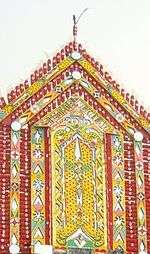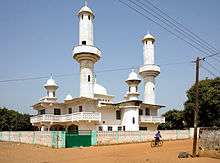Religion in the Gambia
Muslims constitute 96 percent of the population of the Gambia according to CIA factbook, making Gambia a Muslim majority country. The vast majority are Sufi Sunnis influenced with Sufism, of which the main orders represented are Tijaniyah, Qadiriyah.[2] Except for Ahmadiyya, Sufi orders pray together at common mosques.[2] A small percentage of Muslims, predominantly immigrants from South Asia, do not ascribe to any traditional Islamic school of thought.[2]
| Part of a series on |
| Serers and Serer religion |
|---|
  |
|
Deities |
|
Main doctrines |
|
Sacred places
|
|
Notable figures
|
|
Relations with other religions |
|
Education |
|
See also
|
|
Religion in the Gambia (2013 est.)[1]


A significant minority, estimated 3 percent of the population, is Christian, and less than 1 percent practice African Traditional Religion. The Christian community, situated mostly in the west and south of the country, is predominantly Roman Catholic; there are also several Protestant groups including Anglicans, Methodists, Baptists, Seventh-day Adventists, and various small evangelical denominations.[2] There is a small group of followers of the Baha'i Faith and a small community of Sikhs among South Asian immigrants.[2]
Intermarriage between Muslims and Christians is common.[2] In some areas, Islam and Christianity are syncretized with African Traditional Religion.[2] There are few atheists in the country.[2] Although most Gambians are Muslim, some suggest that Islam is usually syncretized with the old Traditional African religion such as the Serer religion.[3][4] Christians also syncretize Christianity with the old Traditional African religion.[5]
Articles 17, 25, 32, 33, and 212 of the Constitution guarantee and protects the freedom of religion.[6]
Article 60 of the constitution prohibits forming political parties that are formed on a religious basis.[6]
The Supreme Islamic Council is an independent body that advises the government on religious issues. Although not represented on the council, the government provides the council with substantial funding. The country's president serves as the minister of religious affairs and maintains a formal relationship with the council.[2][7]
Government meetings and events typically commence with two prayers, one Islamic and one Christian. The government often invites senior officials of both religious groups to open major government events with prayers. The president, a Muslim, delivers a Christmas message to the nation each year and also delivers messages for major Muslim feasts.[8]
The constitution establishes Qadi courts, with Muslim judges trained in the Islamic legal tradition, in specific areas that the chief justice determines. The Qadi courts are located in each of the country's seven regions and apply sharia law. Their jurisdiction applies only to marriage, divorce, custody over children, and inheritance questions for Muslims.[9]
Sharia also applies to interfaith couples where there is one Muslim spouse. Non-Qadi district tribunals, which deal with issues under the customary and traditional law, apply sharia, if relevant when presiding over cases involving Muslims. A five-member Qadi panel has purview over appeals regarding decisions of the Qadi courts and non-Qadi district tribunals relating to sharia.[8]
Foreign missionary groups operate in the country.[2]
The government does not require religious groups to register. Faith-based nongovernmental organizations (NGOs) must meet the same registration and licensing requirements as other NGOs.[2]
See also
References
- "Africa :: GAMBIA, THE". CIA The World Factbook.
- International Religious Freedom Report 2007: Gambia. United States Bureau of Democracy, Human Rights and Labor (September 14, 2007). This article incorporates text from this source, which is in the public domain.
- By Senate (U S ) Committee on Foreign Relations.Annual Report on International Religious Freedom, 2004 p48-49. Compiled by State Dept. (U.S.). Published by Government Printing Office, 2005. ISBN 0-16-072552-6
- Grolier Incorporated. The encyclopedia Americana, Volume 12, P262 Published by Grolier, 2000. ISBN 0-7172-0133-3
- See:
- Annual Report on International Religious Freedom, by Senate (U S ) Committee on Foreign Relations, p 49
- "Gambia's Constitution of 1996 with Amendments through 2004" (PDF). Constitute Project. Retrieved 25 May 2016.
- "Gambia Supreme Islamic Council". Gambia Information Site. Retrieved 25 May 2016.
- "The Gambia". US State Department Religious Freedom Report.
- "Guide to Gambian Legal Information". NYU Global Law and Justice.